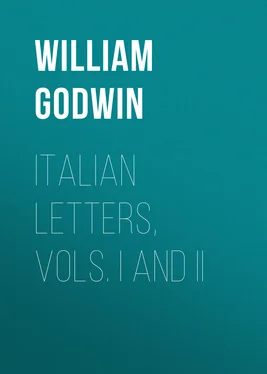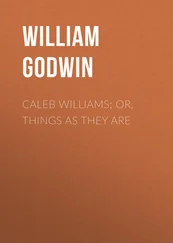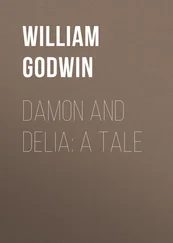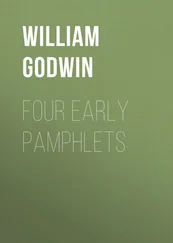William Godwin - Italian Letters, Vols. I and II
Здесь есть возможность читать онлайн «William Godwin - Italian Letters, Vols. I and II» — ознакомительный отрывок электронной книги совершенно бесплатно, а после прочтения отрывка купить полную версию. В некоторых случаях можно слушать аудио, скачать через торрент в формате fb2 и присутствует краткое содержание. Жанр: foreign_prose, История, foreign_edu, foreign_antique, на английском языке. Описание произведения, (предисловие) а так же отзывы посетителей доступны на портале библиотеки ЛибКат.
- Название:Italian Letters, Vols. I and II
- Автор:
- Жанр:
- Год:неизвестен
- ISBN:нет данных
- Рейтинг книги:4 / 5. Голосов: 1
-
Избранное:Добавить в избранное
- Отзывы:
-
Ваша оценка:
- 80
- 1
- 2
- 3
- 4
- 5
Italian Letters, Vols. I and II: краткое содержание, описание и аннотация
Предлагаем к чтению аннотацию, описание, краткое содержание или предисловие (зависит от того, что написал сам автор книги «Italian Letters, Vols. I and II»). Если вы не нашли необходимую информацию о книге — напишите в комментариях, мы постараемся отыскать её.
Italian Letters, Vols. I and II — читать онлайн ознакомительный отрывок
Ниже представлен текст книги, разбитый по страницам. Система сохранения места последней прочитанной страницы, позволяет с удобством читать онлайн бесплатно книгу «Italian Letters, Vols. I and II», без необходимости каждый раз заново искать на чём Вы остановились. Поставьте закладку, и сможете в любой момент перейти на страницу, на которой закончили чтение.
Интервал:
Закладка:
Thus far, my amiable friend, you advanced, but yet I am afraid you have not advanced far enough. I am told there is an honesty and an honour, that preserves a man's character free from impeachment, which is perfectly separate from that sublime goodness that you and I have always admired. But to this sentiment I am by no means reconciled. To speak more immediately to the subject I intended.
What can be more justifiable, or reasonable, than a conformity to the original propensities of our nature? It is true, these propensities may by an undue cultivation be so much increased, as to be productive of the most extensive mischief. The man who, for the sake of indulging his corporeal appetites, neglects every valuable pursuit, and every important avocation, cannot be too warmly censured. But it is no less true, that the passion of the sexes for each other, exists in the most innocent and uncorrupted heart. Can it then be reasonable to condemn such a moderate indulgence of this passion, as interrupts no employment, and impedes no pursuit? This indulgence, in the present civilized state of society, requires no infringement of order, no depravation of character. The legislators of every country, whose wisdom may surely be considered as somewhat greater than that of its priests, have judiciously overlooked this imagined irregularity, and amongst all the penalties which they have ambitiously, and too often without either sentiment or humanity, heaped together against the offences of society, have suffered this to pass unnoticed. Why should we be more harsh and rigorous than they? It is inconsistent with all logic and all candour, to argue against the use of any thing from its abuse. Of what mischief can the moderate gratification of this appetite be the source? It does not indeed romantically seek to reclaim a class of women, whom every sober man acknowledges to be irreclaimable. But with that benevolence that is congenial to a comprehensive mind, it pities them with all their errors, and it contributes to preserve them from misery, distress, and famine.
From what I have now said, I believe you will have already suspected of what nature are those particulars in my conduct, which I set out with an intention of confessing. Whatever may be my merit or demerit in this instance, I will not hide from you that the marquis of San Severino was the original cause of what I have done. You are already sufficiently acquainted with the freedom of his sentiments upon this subject. He is a professed devotee of the sex, and he suffers this passion to engross a much larger share of his time than I can by any means approve. Incited by his exhortations, I have in some measure imitated his conduct, at the same time that I have endeavoured not to fall into the same excesses.
But I believe that I shall treat you more regularly in the manner of a confessor, and render you more master of the subject, by relating to you the steps by which I have been led to act and to justify, that which I formerly used to condemn. I have already told you, how aukward I felt my situation in the first society of the gayer kind, into which my friend introduced me. Though he politely freed me from my present embarassment, he could not help rallying me upon the rustic appearance I made. He apologized for the ill fortune I had experienced, and promised to introduce me to a mistress beautiful as the day, and sprightly and ingenious as Sappho herself.
What could I do? I was unwilling to break with the most amiable companion I had found in the city of Naples. I was staggered with his reasonings and his eloquence. Shall I acknowledge the truth? I was mortified at the singular and uncouth figure I had made. I felt myself actuated with a social sympathy, that made me wish to resemble those of my own rank and age, in any thing that was not seriously criminal. I was involuntarily incited by the warm description San Severino gave me of the beauty and attractions of the lady he recommended. Must we not confess, my St. Julian, setting the nature of the business quite out of the question, that there was something highly disinterested in the behaviour of the marquis upon this occasion? He left his companions and his pleasures, to accommodate himself to my weakness. He managed his own character so little, as to undertake to recommend to me a female friend. And he seems to have neglected the interest of his own pleasures entirely, in order to introduce me to a woman, inferior in accomplishments to none of her sex.
Letter VII
The Same to the Same
Naples
Could I ever have imagined, my dear count, that in so short a time the correspondence between us would have been so much neglected? I have yet received no answer to my last letter, upon a subject particularly interesting, and in which I had some reason to fear your disapprobation. My St. Julian lives in the obscurity of retreat, and in the solitude most favourable to literary pursuits. What avocations can have called off his attention from the interests of his friend? May I be permitted however to draw one conclusion from your silence, that you do not consider my situation as critical and alarming? That although you join the prudent severity of a monitor with the candid partiality of a friend, you yet view my faults in a venial light, and are disposed to draw over them the veil of indulgence?
I might perhaps deduce a fairer apology for the silence on my part from my new situation, the avocations incident to my rank and fortune, and the pleasures that abound in a city and a court so celebrated as that of Naples. But I will not attempt an apology. The novelty of these circumstances have diverted my attention more than they ought from the companion of my studies and the friend of my youth, but I trust I shall never forget him. I have met with companions more gay, and consorts more obsequious, but I have never found a character so worthy, and a friend so sincere.
Since I last addressed my St. Julian, I have been engaged in various scenes both of a pleasurable and a serious kind. I think I am guilty of no undue partiality to my own conduct when I assure you, that I have embarked in the lighter pursuits of associates of my own age without having at any time forgotten what was due to the lustre of my ancestry, and the favour of my sovereign. I have not injured my reputation. I have mingled business and pleasure, so as not to sacrifice that which occupies the first place, to that which holds only the second.
I trust that my St. Julian knows me too well, to suppose that I would separate philosophy and practice, reason and action from each other. It was by the instructions of my friend, that I learned to rise superior to the power of prejudice, to reject no truth because it was novel, to refuse my ear to no arguments because they were not backed by pompous and venerable names. In pursuance of this system, I have ventured in my last to suggest some reasons in favour of a moderate indulgence of youthful pleasures. Perhaps however my dear count will think, that I am going beyond what even these reasons would authorize in the instance I am about to relate.
You are not probably to be informed that there are a certain kind of necessary people, dependents upon such young noblemen as San Severino and his friends, upon whom the world has bestowed the denomination of pimps. One of these gentlemen seemed of late to feel a particular partiality to myself. He endeavoured by several little instances of officiousness to become useful to me. At length he told me of a young person extremely beautiful and innocent, whose first favours he believed he could engage to procure in my behalf.
At that idea I started. "And do you think, my good friend," said I, "because you are acquainted with my having indulged to some of those pleasures inseparable from my age, that I would presume to ruin innocence, and be the means of bringing upon a young person so much remorse and such an unhappy way of life, as must be the inevitable consequence of a step of this kind?" "My lord," replied the parasite, "I do not pretend to be any great casuist in these matters. His honour of San Severino does I know seldom give way to scruples of this kind. But in the instance I have mentioned there are several things to be said. The mother of the lady, who formerly moved in a higher sphere than she does at present, never maintained a very formidable character. This daughter is the fruit of her indiscriminate amours, and though I am perfectly satisfied she has not yet been blown upon by the breath of a mortal, her education has been such as to prepare her to follow the venerable example of her mother. Your lordship therefore sees that in this case, you will wrong no parent, and seduce no child, that you will merely gather an harvest already ripe, and which will be infallibly reaped by the first comer."
Читать дальшеИнтервал:
Закладка:
Похожие книги на «Italian Letters, Vols. I and II»
Представляем Вашему вниманию похожие книги на «Italian Letters, Vols. I and II» списком для выбора. Мы отобрали схожую по названию и смыслу литературу в надежде предоставить читателям больше вариантов отыскать новые, интересные, ещё непрочитанные произведения.
Обсуждение, отзывы о книге «Italian Letters, Vols. I and II» и просто собственные мнения читателей. Оставьте ваши комментарии, напишите, что Вы думаете о произведении, его смысле или главных героях. Укажите что конкретно понравилось, а что нет, и почему Вы так считаете.












